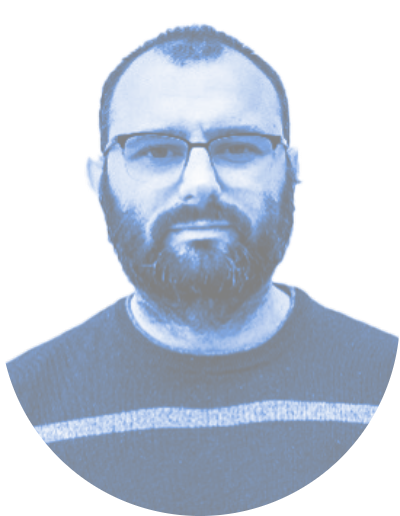
Claudio Puglia is a researcher of the Italian National Research Council of Pisa. He got a Ph.D. in Condensed Matter Physics of the University of Pisa. During his academic career he is focusing on the study of the electrostatic field-effect in all-metallic superconducting devices and he co-authored several papers on this subject. He has developed experience in nanostructured device fabrication and their measurements at cryogenic temperatures. His interest in the connection between science and industry led him to be one of the winners of the Industrial Problem Solving with Physics 2018 competition. He is an eclectic and competitive person; therefore, he excels in sports activities. He is particularly passionate about beach volleyball and CrossFit.

Francesco Giazotto is a research director at NEST Istituto Nanoscienze-CNR, Pisa, Italy. He has co-authored 168 scientific publications and 4 patents (h-index, Google Scholar 36). He has given 103 invited talks at international conferences and universities. He is the group leader of the Superconducting Quantum Electronics Lab (SQEL) research group consisting of 17 persons including master students (3), PhD students (5), postdoc researchers (3), temporary research scientist (2) and research scientists (3). His main research activities, either experimental or theoretical, range from quantum charge and thermal transport at the nanoscale and quantum technology to thermal effects in mesoscopic systems, superconducting electronics and superconducting spintronics.

Giorgio de Simoni is a research scientist of the Nanoscience Institute of the Italian National Research Council. He is one of the discoverers of the field effect in all-metallic superconducting transistors and he coauthored about ten papers in the last two years on this topic. He got his PhD in Condensed Matter Physics from Scuola Normale Superiore and has been always working in mesoscopic device physics for opto-electronics, sensing, and computation applications. He has a considerable experience in nanostructured device fabrication and their measurements at cryogenic temperatures. Then, he is a technology enthusiast, he loves to play guitar, motorcycle and snowboard riding. He is a husband, and a two-children father.
Giorgio de Simoni is a research scientist of the Nanoscience Institute of the Italian National Research Council. He is one of the discoverers of the field effect in all-metallic superconducting transistors and he coauthored about ten papers in the last two years on this topic. He got his PhD in Condensed Matter Physics from Scuola Normale Superiore and has been always working in mesoscopic device physics for opto-electronics, sensing, and computation applications. He has a considerable experience in nanostructured device fabrication and their measurements at cryogenic temperatures. Then, he is a technology enthusiast, he loves to play guitar, motorcycle and snowboard riding. He is a husband, and a two-children father.

Angelo Di Bernardo (32 years) is an associate professor and Sofja Kovalevskaja research group leader in the Physics Department of the University of Konstanz in Germany since October 2019. Originally from Naples in the South of Italy, he earned a B.Sc. and M.Sc. in Engineering from the University of Naples (2011), a M.Sc. as a Fulbright scholar in Quantum Physics and Nanoscience from Arizona State University (2012), and a M.Sc. and Ph.D. in Nanoscience and Materials Science from the University of Cambridge (2016). After his Ph.D. he was appointed to a research fellowship by St John’s College to carry out a research project as independent investigator at the University of Cambridge (2016-2019). His research work focuses on superconductor/ferromagnet devices for superconducting spintronics, and his fields of expertise include materials growth and synthesis, device fabrication, low-temperature transport, spectroscopy techniques. For his academic achievements, he has been awarded several prises including a IEEE Council on Superconductivity Fellowship Award (2015), a Junior Research Fellowship, St John’s College (2016), the ESAS prise for young researchers (2017), the Institute of Physics Brian Pippard Prize (2018), a Sofja Kovalevskaja award (2019).
Angelo Di Bernardo (32 years) is an associate professor and Sofja Kovalevskaja research group leader in the Physics Department of the University of Konstanz in Germany since October 2019. Originally from Naples in the South of Italy, he earned a B.Sc. and M.Sc. in Engineering from the University of Naples (2011), a M.Sc. as a Fulbright scholar in Quantum Physics and Nanoscience from Arizona State University (2012), and a M.Sc. and Ph.D. in Nanoscience and Materials Science from the University of Cambridge (2016). After his Ph.D. he was appointed to a research fellowship by St John’s College to carry out a research project as independent investigator at the University of Cambridge (2016-2019). His research work focuses on superconductor/ferromagnet devices for superconducting spintronics, and his fields of expertise include materials growth and synthesis, device fabrication, low-temperature transport, spectroscopy techniques. For his academic achievements, he has been awarded several prises including a IEEE Council on Superconductivity Fellowship Award (2015), a Junior Research Fellowship, St John’s College (2016), the ESAS prise for young researchers (2017), the Institute of Physics Brian Pippard Prize (2018), a Sofja Kovalevskaja award (2019).

Federico Paolucci is a research scientist at the Nanoscience Institute of the Italian National Research Council. He got his PhD in Physics from University of Stuttgart and Max Planck Institute of Solid State Research working on cutting edge graphene-based lithium batteries. Over the years as scientist, Federico worked at Politecnico di Torino and Istituto Italiano di Fisica Nucleare studying electronic and thermal transport in hybrid semiconductor/normal metal/superconductor systems. Currently, the core of his career is developing innovative schemes for fast superconducting electronics and ultrasensitive radiation sensing.
Federico Paolucci is a research scientist at the Nanoscience Institute of the Italian National Research Council. He got his PhD in Physics from University of Stuttgart and Max Planck Institute of Solid State Research working on cutting edge graphene-based lithium batteries. Over the years as scientist, Federico worked at Politecnico di Torino and Istituto Italiano di Fisica Nucleare studying electronic and thermal transport in hybrid semiconductor/normal metal/superconductor systems. Currently, the core of his career is developing innovative schemes for fast superconducting electronics and ultrasensitive radiation sensing.

Elia Strambini is a research scientist at NEST Istituto Nanoscienze-CNR, Pisa, Italy. After the PhD at Scuola Normale Superiore in Pisa he joined the MESA+ Institute of Nanoelectronics in Twente with a postdoctoral fellowship. He was awarded with a personal Marie Curie fellowship used to begin his own project at Nano-CNR in Pisa where he was appointed as researcher. His research activities ranges from quantum technologies to superconducting electronics at low dimensionality, spintronics and topological materials. He has an extensive experience in nanofabrication and cryogenic electrical characterization of mesoscopic systems at low dimensionality including ballistic and diffusive semiconductors, metals, organic materials and hybrid superconducting/magnetic devices.
Elia Strambini is a research scientist at NEST Istituto Nanoscienze-CNR, Pisa, Italy. After the PhD at Scuola Normale Superiore in Pisa he joined the MESA+ Institute of Nanoelectronics in Twente with a postdoctoral fellowship. He was awarded with a personal Marie Curie fellowship used to begin his own project at Nano-CNR in Pisa where he was appointed as researcher. His research activities ranges from quantum technologies to superconducting electronics at low dimensionality, spintronics and topological materials. He has an extensive experience in nanofabrication and cryogenic electrical characterization of mesoscopic systems at low dimensionality including ballistic and diffusive semiconductors, metals, organic materials and hybrid superconducting/magnetic devices.

Simone Gasparinetti (male, 34, born in Bologna, Italy) is an assistant professor in the Department of Microtechnology and Nanoscience (MC2) at Chalmers University of Technology, Sweden, and a principal investigator of the Wallenberg Centre for Quantum Technology (WACQT), where he leads a team of 7. He obtained his PhD at Aalto University, Finland (November 2014). Before joining Chalmers, he was a post-doc at ETH Zurich (2015-2018). He has co-authored more than 30 scientific publications. His research brings together nano-electronics, microwave engineering, and quantum physics, to deliver proof-of-principle realizations of quantum computation with superconducting circuits. Since 2020, he coordinates an industrial PhD program with Ericsson on distributed quantum computing.
Simone Gasparinetti (male, 34, born in Bologna, Italy) is an assistant professor in the Department of Microtechnology and Nanoscience (MC2) at Chalmers University of Technology, Sweden, and a principal investigator of the Wallenberg Centre for Quantum Technology (WACQT), where he leads a team of 7. He obtained his PhD at Aalto University, Finland (November 2014). Before joining Chalmers, he was a post-doc at ETH Zurich (2015-2018). He has co-authored more than 30 scientific publications. His research brings together nano-electronics, microwave engineering, and quantum physics, to deliver proof-of-principle realizations of quantum computation with superconducting circuits. Since 2020, he coordinates an industrial PhD program with Ericsson on distributed quantum computing.
